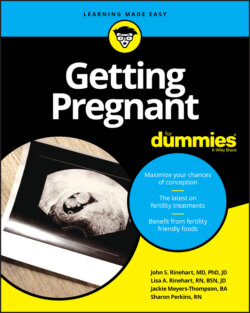Читать книгу Getting Pregnant For Dummies - Sharon Perkins - Страница 33
The vagina
ОглавлениеThe vagina mostly serves as a passageway, first for the penis to deliver sperm up near the opening of the uterus, and later for the delivery of the baby. If you have a very small vaginal opening, intercourse may be uncomfortable. If your vaginal opening is large, as it may be after having a baby, sex may be less pleasurable. Neither condition, however, has any effect on your ability to get pregnant.
The vagina secretes fluid during sexual arousal, making it easier — and a lot more enjoyable! — for a penis to enter the vagina. Sometimes (especially when you have to have sex at a particular time), the lubrication function may not work as well as it should. In these cases, you may need a personal lubricant. This is much better for your vagina than trying to have a “dry experience,” which causes abrasion of the vagina and will make intercourse that much more uncomfortable the next time.
There is an entire industry that has grown up over lubricants, intercourse, and fertility. Does it really make that much difference? Maybe. For example, Vaseline is a terrible lubricant because it is too thick. Some lubricants may actually kill sperm. So if you want to spend money on lubricants that have been designed for couples trying to conceive, go ahead. If you want to be practical, plain old vegetable oil, the kind you cook with, is just as good.
In very rare cases, the uterus and vagina of some women do not develop normally and may be missing, even though the ovaries function properly and external genitalia are normal. The formal name of this syndrome is Mayer-Rokitansky-Küster-Hauser, a condition that is usually diagnosed when you don’t start your periods by age 16.
Found at the entrance to the vagina, the hymen is a nonfunctional piece of circular tissue that has no physiologic function and very few nerve endings. This donut-shaped piece of tissue generally has one or more small opening(s) at birth and, as the baby girl grows, the tissue thins and stretches. While bleeding during a woman’s first act of intercourse is often described as “tearing the hymen,” in truth, by the time a girl reaches adolescence, the hymen is not usually a barrier to tampons or an erection. An imperforate hymen, one that has no holes, occurs in less than ½ percent of the female population and can be corrected with a very simple procedure to snip open the hymen. Women with an imperforate hymen will not have periods (amenorrhea), as the hymen can cause blood to back up behind the small opening. This blood can be forced back up into the fallopian tubes. Women with an imperforate hymen have a higher incidence of endometriosis, a disease that can affect your ability to get pregnant in several ways. (See Chapter 7 for more on endometriosis.)
